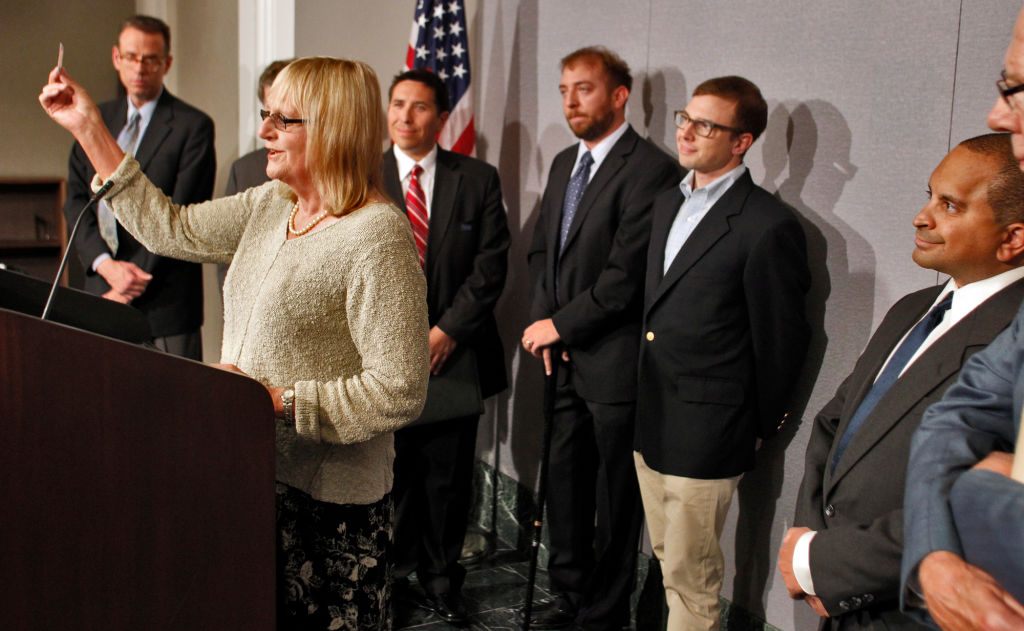
The Montana state legislature on Wednesday barred its only transgender member, Zooey Zephyr, from the chamber after she said lawmakers would have “blood on your hands” if they passed a bill barring gender-affirming care for minors. She was allowed to vote remotely.
Among those marveling at the spectacle is Susan Kimberly, 80, who can’t help but take the long view. If not the first transgender figure on the U.S. political landscape, she was surely the most warmly received at the time. When she came out in 1983, Kimberly—who had previously presided over the St. Paul, Minn., city council—was embraced not only by the public but by both political parties. She was soon hired by the Democratic mayor of St. Paul, and, ten years later, made deputy mayor by a Republican successor, who took her to Washington with him when he was elected to the Senate.
“They were all splendid,” Kimberly says, adding: “We have not come a long way.”
Read more: What to Know About the Gender-Affirming-Care Bans Spreading Across the Country
Forty years old when she made her transition, Kimberly serves as a kind of human bridge from an era when the mysteries of gender, sex, and identity inspired more curiosity and, surprisingly, sometimes less argument. Now retired, she is revisiting her play, From Superman to Lois Lane, which tells her story and was produced by St. Paul’s History Theater in 2020.
Kimberly spoke to TIME from her St. Paul home on Friday, about the time Montana’s Republican Gov. Greg Gianforte signed the bill Zephyr was protesting. (This interview has been condensed and edited for clarity.)
TIME: What do you make of what’s going on in Montana?
SUSAN KIMBERLY: The Star Tribune today had a big photo of our governor [Democrat Tim Walz] signing the bill making Minnesota a refuge for people seeking gender-affirming care. Standing tall both literally and figuratively behind the governor was Leigh Fink, the first transgender legislator in the Minnesota legislature and the sponsor of the law. And out in Montana, Zooey Zephyr isn’t even allowed into the chamber.
What accounts for the difference?
We’ve had almost 50 years of transgender people coming out in the state of Minnesota. People get used to us. The city council president in Minneapolis, Andrea Jenkins, she’s transgender. There are transgender people in positions of responsibility all over the community. And so we’re not some commodity that is threatening to people. I never thought I would see the day that the majority of states were considering this kind of anti-trans bullying legislation. And it’s not based on science. It’s based on conservative Christian beliefs; a lot of stuff is made up.
You must have been one of the first, if not the very first, transgender woman in the country in the public policy and politics realm.
I had been elected as a man to the St. Paul City Council in 1974. So I was a well-known political figure in the Twin Cities when I came out and I think that was the first situation of that kind. One of the first in the country. And I had this terrifying experience where the press corps from St. Paul and Minneapolis knew who I was, and wanted me to tell the story. And I concluded that the only way I was going to survive this was to tell the truth in depth. I think that won over the majority of people in the community and I told my whole story in great detail. And people realized that this is a hard thing to do.
Was transgender the term you used then?
When I came out I described myself as a transsexual. And I used to explain that transsexual was a subset of the set transgender. And now we refer to ourselves generally as transgender people.
Read more: The Transgender Tipping Point
You would see phrases like “sex change,” right?
I used to describe what I went through as a sex change, which we now call gender-affirming care. You know, being a journalist I kind of liked Anglo-Saxon language. Everybody could relate to it. But “gender-affirming care” is truly what it is. And it isn’t that people go from being a man to a woman. It’s that a person’s gender is discovered and uncovered and tested. And then the physical changes are made to conform with that discovery. And in that sense, transgender women were women.
You spoke about the whole process, including surgery, in a detail. That’s now considered impolite or improper, isn’t it?
A lot of transgender people feel that way. When I was confronted with the choice of ducking the story or not, I decided the only way to will to win the day was to just tell the story. And at that time, I had not had gender-affirming surgery. Because at that time I was in my year of transition. But I said so. And now it’s sort of like you’re not supposed to ask and I think those kinds of values may get in the way of understanding.
You told a reporter in 2010 that you lost more friends when you became a Republican than when you became a woman. Are you a Republican now?
I’m not. I was a Republican until he [Donald Trump] came down the escalator and I was Republican then through the caucuses in Minnesota in 2016. I caucused for Marco Rubio. Minnesota is the only state that Rubio carried in that primary election. And the day after he carried Minnesota, he withdrew from the race. And at that point, I stopped being a Republican. I decided it’s over. We’re doomed.

What accounted for your move from the Democrats in the first place? Just to stay with Norm Coleman, the Republican mayor?
After I joined Norm’s administration, he did not require that I or anyone else become a Republican, but I was comfortable with conservative values. And there was a wonderful Republican Party and great philosophies and values and theories. That’s all gone. And so now I’m, I’m sorry, like, who’s the Arizona senator?
Kyrsten Sinema?
Yes. I’m kind of like her. I’m not a Democrat. I’m certainly not a Republican. And I’m just waiting to see where it goes. And I’m concerned about where it’s headed right now.
Both sides in this issue talk a lot about children.
Well, kids are involved. I wasn’t a child when I went through transition. I was 40 years old. But I can tell you that a childhood as a gender-dysphoric child is a miserable experience. To allow children to be who they know they are seems to be a reasonable proposition.
The system is set up so that you’re still have to go through hoop after hoop after hoop in order to get to the point where you have all of the approvals necessary to obtain gender-affirming care. You may get puberty blockers in the interim. But you don’t get surgery. And I know how difficult it was to get the approvals back in the in the ’80s and I’ve spoken recently with people going through the process now. And they basically have the same complaints that I did 40 years ago. So it’s not easy.
You can’t do this on a lark. The fact that some children have the support and understanding of their parents, that should be celebrated, not condemned. And if it scares some conservative Christians, so be it.
Read more: Pediatricians Who Serve Trans Youth Face Increasing Harassment. Lifesaving Care Could Be on the Line
You did this play, From Superman to Lois Lane.
I’m very proud of that title. What I just have discovered is that Bob Sylvester still lives within me. I don’t use the term dead-naming at all, because that’s who I was. And he’s still within me. And so there’s a very, very important scene in the play near the end, where “Bob” and “Susan” sit on a beach—in Montana of all places—and talk about what they’ve dealt with, what they’ve had to resolve. But the play is about dealing with my own relationship with my former wife, and my relationship with who I was and who I have become. It’s a very human process. It’s not really a political process.
And yet it seems to be.
When I was president of city council, it was my responsibility to maintain decorum in the chamber. And I did it with a firm grasp on the gavel. And I did it with a good sense of humor. And I did it by allowing people to disagree. The notion that we now just don’t have any tolerance for a difference of opinion, it’s like, what is our democracy come to? I think you can easily make the case we’re in deep trouble.
More Must-Reads from TIME
- Cybersecurity Experts Are Sounding the Alarm on DOGE
- Meet the 2025 Women of the Year
- The Harsh Truth About Disability Inclusion
- Why Do More Young Adults Have Cancer?
- Colman Domingo Leads With Radical Love
- How to Get Better at Doing Things Alone
- Michelle Zauner Stares Down the Darkness
Contact us at letters@time.com